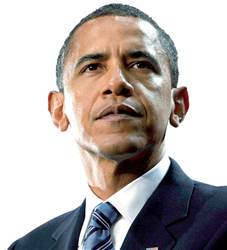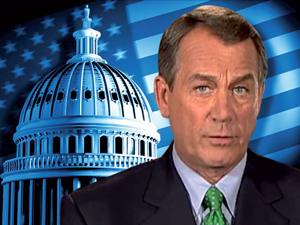Can President Obama, GOP avoid 'fiscal cliff?'
By Askia Muhammad -Senior Correspondent- | Last updated: Nov 13, 2012 - 10:44:28 AMWhat's your opinion on this article?

The U.S. government has reached a debt ceiling nearing the $164 trillion mark, creating an enormous fi scal cliff. Graphics: MGNOnline
|
WASHINGTON (FinalCall.com) - Less than a week after his stunning re-election victory, President Barack Obama has waded into the next major battle of his presidency, the looming “fiscal cliff” of tax increases and drastic spending cuts that could tip the country back into another economic recession at the start of 2013.
The metaphor of the fiscal cliff is taken from nature. It was agreed to by members of Congress who designed it to be so bad that the president, and the Republicans and Democrats in Congress would agree to take action to avoid going over it, just in time. That time is at hand with a lame-duck session of Congress which began Nov. 13 and which is required to act before Dec. 31 in order to undo the trap they set for themselves in a previous budget battle in August 2011.

“Now, I’m open to compromise and new ideas,” the President said Nov. 10. “But I refuse to accept any approach that isn’t balanced. I will not ask students or seniors or middle-class families to pay down the entire deficit while people making over $250,000 aren’t asked to pay a dime more in taxes.” —Pres. Barack Obama |
“Now, I’m open to compromise and new ideas,” the President said Nov. 10. “But I refuse to accept any approach that isn’t balanced. I will not ask students or seniors or middle-class families to pay down the entire deficit while people making over $250,000 aren’t asked to pay a dime more in taxes.”
Predictably, Speaker of the House John Boehner (R-Ohio) argued against any tax hikes as part of the deal. “Instead of raising tax rates on the American people and accepting the damage it will do to our economy, let’s start to actually solve the problem,” Mr. Boehner said in separate remarks.
“Let’s focus on tax reform that closes special interest loopholes and lowers tax rates. Instead of accepting arbitrary cuts that will endanger our national defense, let’s get serious about shoring up the entitlement programs that are the primary drivers of our country’s massive, growing debt.”
If the two sides fail to reach an agreement, on Dec. 31, all the Bush-era tax cuts will expire on the middle class as well as on the wealthy, and automatic “sequestered” budget cuts will take place, 50 percent of which would be from military spending.
Economist Paul Krugman, Professor of Economics and International Affairs at the Woodrow Wilson School of Public and International Affairs at Princeton University and Centenary Professor at the London School of Economics argues against precipitous concessions by the White House. “How far should President Obama go in accommodating the G.O.P.’s demands?” concerning the fiscal cliff, Prof. Krugman asked recently in The New York Times.

Representative John Boehner (R-OH).
When the talks between Messrs. Obama and Boehner broke down in August 2011, Democrats and Republicans had to rush to craft a temporary deficit-reduction plan—the fiscal cliff—to give themselves political cover so they could raise the government’s borrowing limit. Today, while the fiscal cliff is in the spotlight, the government’s borrowing limit. |
A stalemate, Prof. Krugman argues “would hurt Republican backers, corporate donors in particular, every bit as much as it hurt the rest of the country. As the risk of severe economic damage grew, Republicans would face intense pressure to cut a deal after all.” The president, he said, can win, without doing or conceding anything to the Tea Party-dominated House GOP caucus.
“So stand your ground, Mr. President, and don’t give in to threats. No deal is better than a bad deal,” said Prof. Krugman.
Despite his outreach in White House meetings with business CEOs and with labor leaders before his first negotiations with House and Senate leaders from both parties Nov. 16, President Obama may very well be prepared to concede his “winning hand” to hardline Republicans, according to Dr. Wilmer Leon, assistant professor of political science at Howard University, who coined the phrase that President Obama seems to willingly “make concessions without a demand” being placed on him.
“I’ve got to go with history,” Dr. Leon said Nov. 9 in response to a question from The Final Call on “Spectrum Today” heard on Pacifica Radio’s WPFW-89.3FM in Washington. “And history tells me watch out for the (president to) cave (in). Until he shows me something different … every time I’ve bet on him to stand up and man-up, he’s folded up like bad lawn furniture,” said Dr. Leon.
In September 2011, Mr. Obama released an 80-page deficit-reduction plan that included tax increases on the wealthy, spending cuts and modest changes to Medicare and Medicaid. No new details on deficit reduction have been released by the administration since then.
The White House wants roughly $1.5 trillion in new taxes over 10 years as part of a $4 trillion deficit-reduction package. To start, Mr. Obama has proposed letting tax rates rise to 39.6 percent from 35 percent on income over $200,000 for individuals and $250,000 for couples, which would raise roughly $440 billion in new revenue over 10 years, according to White House estimates.
Both the White House and Republican leaders have said so far that the rhetoric from the other side has been encouraging. The president’s approach now, appears to be in sharp contrast to his 2011 strategy, when he met privately with Mr. Boehner to try to cobble together a package of tax and spending changes to reduce the deficit. Fearing a rebellion from his own caucus which might have even ended his leadership, Mr. Boehner abruptly walked out of those meetings before any agreement was reached.
This time around Mr. Obama and his aides have promised to be even more amenable to the Republicans, who lost a landslide in Electoral College votes, popular votes, and in 27 of the 50 states in the 2012 vote.
“I think there are a lot of ways to skin this cat so long as everybody comes with a positive, constructive attitude toward the task,” Obama adviser David Axelrod said on CBS’s “Face the Nation” Nov. 11.
With the spotlight on President Obama, another player in this contest is also being tested. Mr. Boehner’s leadership of the House Republican conference—an often cantankerous group which includes two factions: dozens of Tea Party-supported freshmen members who put a premium on confrontation, as well as a more pragmatic GOP wing which has been around longer and which may be better suited to the give-and-take required in the legislative process.
When the talks between Messrs. Obama and Boehner broke down in August 2011, Democrats and Republicans had to rush to craft a temporary deficit-reduction plan—the fiscal cliff—to give themselves political cover so they could raise the government’s borrowing limit. Today, while the fiscal cliff is in the spotlight, the government’s borrowing limit, or its “debt ceiling,” may be the unspoken-of so-called “elephant in the room.”
The United States is on course to hit its debt ceiling, which stands at $16.4 trillion, in early 2013, an Oct. 31 statement from the U.S. Treasury Department said. Some analysts predict that by juggling some payments and by once again resorting to “extraordinary measures” that will come due, the Treasury may be able to postpone needing to exceed the current limit until as late as February.
Experts insist that even if the Treasury takes those steps to prevent a breach of the debt limit, it will be a very short-term solution.
“There’s less money available for extreme measures than there was last year. It will buy us less time,” Steve Bell, director of the Economic Policy Project at the Bipartisan Policy Center said, according to UPI.com.
The possibility of defaulting on U.S. obligations is a much direr scenario than going over the fiscal cliff, said Patrick Lester director of federal fiscal policy at OMB Watch, a government watchdog group in Washington.
“Sequestration is nothing like the debt ceiling,” said Mr. Lester. “If we had gone past the ceiling, you are really messing with the faith and credit of the U.S. Markets have every reason to freak out if we don’t pay our bills.”
The last time the country neared the debt limit, Congress engaged in a struggle that threatened to shut down the government and leave the United States to default on its debt for the first time in U.S. history.
The solution then was the Budget Control Act of 2011. That agreement averted defaults then, but it also created the fiscal cliff the country faces today. So, unless Mr. Obama includes an agreement on raising the debt ceiling in his upcoming negotiations on the fiscal cliff over which he has the superior leverage, the administration may be brought to its knees once again by the Tea Party-Republicans who can refuse to agree to raise the debt limit unless they get even greater concessions from the White House.
While Senate Majority Leader Harry Reid (D-Nev.) and Speaker Boehner have both stated that they hope to avoid the dramatics of the last debt ceiling debate, a painless negotiation is unlikely, according to Mr. Lester. “If you read between the lines what they basically said is nothing is different today than it was six months ago,” he warned.
Related news:
The Only Way To Expose The Depth Of The Rockefeller - Rothschild Connection (FCN, 06-07-2012)
Tea Party wins in fiscal hostage taking (FCN, 08-11-2011)
Obama surrenders on debt ceiling deal (FCN, 08-11-2011)
Debt Monetization: The Subject President Obama and Rep. Paul Ryan Won't Touch (FCN, 04-28-2011)
INSIDE STORIES AND REVIEWS
-
-
About Harriett ... and the Negro Hollywood Road Show
By Rabiah Muhammad, Guest Columnist » Full Story -
Skepticism greets Jay-Z, NFL talk of inspiring change
By Bryan 18X Crawford and Richard B. Muhammad The Final Call Newspaper @TheFinalCall » Full Story -
The painful problem of Black girls and suicide
By Charlene Muhammad -National Correspondent- » Full Story -
Exploitation of Innocence - Report: Perceptions, policies hurting Black girls
By Charlene Muhammad -National Correspondent- » Full Story -
Big Ballin: Big ideas fuel a father’s Big Baller Brand and brash business sense
By Bryan Crawford -Contributing Writer- » Full Story






 Click Here Stay Connected!
Click Here Stay Connected!








